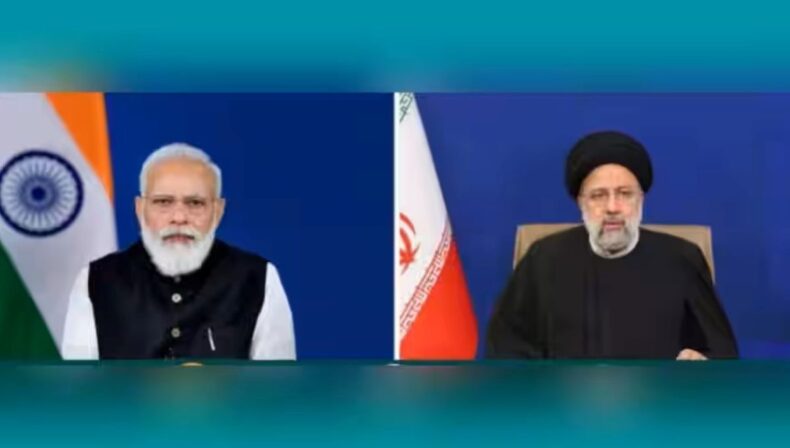Indian Prime Minister Narendra Modi engaged in a phone discussion with Iranian President Ebrahim Raisi on Friday, August 18th. According to a press release, the conversation revolved around bilateral matters and the expansion of the BRICS grouping.
They also touched on regional issues, with Prime Minister Modi highlighting the deep historical and cultural bonds between India and Iran that foster strong people-to-people ties.

During their talk, Prime Minister Modi and President Raisi reaffirmed their commitment to strengthening bilateral cooperation. They placed particular emphasis on fully realizing the potential of the Chabahar Port, envisioning it as a vital connectivity hub between the two countries.
Although the Iranian president was initially slated to visit India for the Shanghai Cooperation Organisation (SCO) summit last month, the event was shifted to a virtual format just a couple of days before.
The upcoming meeting between the two leaders will take place in Johannesburg on the sidelines of the BRICS summit.
Upcoming BRICS Summit and the Significance of Multilateral Cooperation
Amidst considerable anticipation, the upcoming BRICS Summit is set to kick off next week, featuring prominent leaders from Brazil, Russia, India, China, and South Africa.
The global spotlight is fixed on the developments that unfold during this event. The gathering, which represents nearly 40 percent of the world’s population and 26 percent of the global economy, will convene in Johannesburg from August 22 to 24.

Caption: BRICS Foreign Ministers Back South Africa’s 2024 Chairship and 15th Summit Hosting
In the lead-up to the summit, a significant point of discussion has been the expansion of the BRICS group. China, aiming to bolster its geopolitical influence vis-à-vis the US, has been the driving force advocating for expansion.
Russia, dealing with isolation due to the conflict with Ukraine, is fully supportive of expansion, along with South Africa. Meanwhile, India remains undecided and non-committal, while Brazil holds a high degree of skepticism toward any new additions.
While enlarging the membership remains a priority, the forum members are first expected to outline the criteria for admitting new participants. Originally formed to unite emerging economies poised to dominate the global economy by 2050, it remains uncertain if the requirements will be adjusted to accommodate new countries, according to experts.
Iran’s Bid to Join BRICS
With the imminent BRICS Summit approaching, there is growing focus on Iran’s desire to become part of the bloc. The Iranian President’s invitation to the upcoming summit underlines the importance of this development.
The issue of expanding BRICS to encompass new member nations, Iran included, has been in discussions. Approximately 40 countries, including Saudi Arabia, Argentina, Kazakhstan, Comoros, and the United Arab Emirates, have reportedly expressed interest in joining the BRICS group.
India’s Perspective on BRICS Expansion
Previously, Arindam Bagchi, the spokesperson for the Ministry of External Affairs, stated, “In accordance with last year’s directive from the leaders, BRICS members are currently engaged in internal deliberations regarding the guiding principles, standards, criteria, and procedures for the expansion of BRICS. This is being done through comprehensive consultation and consensus.”
India and Iran possess an enduring and complex connection that has deep historical, cultural, and strategic foundations. Their relationship has spanned diverse fields, encompassing trade, energy, cultural interchange, and cooperation within the region.
This deliberative approach underscores India’s commitment to multilateral decision-making and the cohesive growth of the BRICS consortium. By participating in these internal discussions, India is contributing to the formation of a framework that will dictate how new members can be integrated into the grouping.
This framework is expected to ensure that any expansion aligns with the founding objectives of BRICS, which was established to unite emerging economies capable of making a substantial impact on the global stage by 2050.
The deliberations also reflect India’s appreciation for the significance of consensus-building in multilateral forums. By discussing and mutually agreeing upon the principles and criteria for expansion, India aims to create a foundation of mutual understanding and collaboration among member nations.
It aligns with India’s broader diplomatic approach of fostering strong relationships and promoting stability within international partnerships













